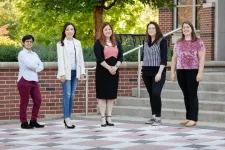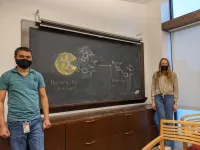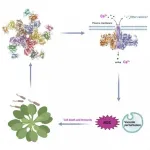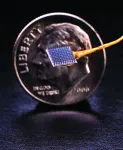INFORMATION:
Research reveals new approach to understanding our wellbeing
The ability to connect and feel a sense of belonging are basic human needs but new Swansea University research has examined how these are determined by more than just our personal relationships
2021-05-12
(Press-News.org) The ability to connect and feel a sense of belonging are basic human needs but new Swansea University research has examined how these are determined by more than just our personal relationships.
Research led by psychologist Professor Andrew Kemp, of the College of Human and Health Sciences, highlights the importance of taking a wider approach to wellbeing and how it can be influenced by issues such as inequality and anthropogenic climate change.
Professor Kemp worked with PhD student Jess Mead and consultant clinical psychologist Dr Zoe Fisher, of the University's Health and Wellbeing Academy, on the study which presents a transdisciplinary framework to help understand and improve wellbeing.
Professor Kemp said: "We define wellbeing as positive psychological experience, promoted by connections to self, community and environment, supported by healthy vagal function, all of which are impacted by socio-contextual factors that lie beyond the control of the individual."
The researchers say their latest findings, which have just been published in Frontiers in Psychology, are particularly topical as society looks to recover and learn from Covid-19.
He said: "Our framework has already contributed to a better understanding of how to protect wellbeing during the pandemic and has led to the development of an innovative wellbeing science intervention, targeting university students and people living with acquired brain injury."
Professor Kemp added: "We feel our invited paper is timely as it not only aligns with a post-pandemic future that requires societal transformation, but it also picks up on global efforts to promote planetary wellbeing.
"Globalisation, urbanisation and technological advancements have meant that humans have become increasingly disconnected from nature. This continues despite research showing that contact with nature improves wellbeing."
The research reveals the advantages to health and wellbeing derived from connecting to oneself, others and nature and emphasises a need for focused efforts to tackle major societal issues that affect our capacity for connection.
He added: "The poorest are disproportionally impacted by major societal challenges including increasing burden of chronic disease, societal loneliness and anthropogenic climate change.
"Economic inequality has adverse impacts on the entire population, not just the poor, so improving economic inequality is fundamental to improving population wellbeing."
ELSE PRESS RELEASES FROM THIS DATE:
Youths with diverse gender identities bullied up to three times more than peers
2021-05-12
CHAMPAIGN, Ill. -- Young people with diverse gender identities may be bullied and victimized up to three times more often than peers who identify as male or female, a new study of more than 4,464 adolescents in Illinois found.
The students were part of a statewide survey of eighth- through 12th-grade youths in Illinois schools.
"Transgender youths reported the highest rates of all forms of peer victimization, which were double to nearly triple those of males and up to 2.6 times higher than those of females," said social work professor Rachel Garthe of the University of Illinois Urbana-Champaign, who led the research.
"Slightly ...
Brain research gets a boost from mosquitos
2021-05-12
Can a protein found in a mosquito lead to a better understanding of the workings of our own brains? Prof. Ofer Yizhar and his team in the Weizmann Institute of Science's Neurobiology Department took a light-sensitive protein derived from mosquitos and used it to devise an improved method for investigating the messages that are passed from neuron to neuron in the brains of mice. This method, reported today in Neuron, could potentially help scientists solve age-old cerebral mysteries that could pave the way for new and improved therapies to treat neurological and psychiatric conditions.
Yizhar and his lab team develop so-called optogenetic methods - research techniques that allow them to "reverse engineer" the activity of specific brain circuits ...
Fighting food insecurity by building better beans
2021-05-12
EAST LANSING, Mich. - As climate change threatens global food security, researchers at Michigan State University are building better beans crucial to human nutrition by tapping into the genetics of the more heat-resistant tepary bean.
The tepary bean (Phaseolus acutifolius A. Gray) is a sister of the common bean which includes kidney, pinto and navy beans. "The common bean is the number one source of protein and nutrients for many people living in Central America and Africa," said Robin Buell, a professor of plant biology in MSU's College of Natural Science and former director of the Plant Resilience Institute.
Her research on bean genetics was published May 11 in Nature Communications.
"Mother nature has already made plants that are adapted to different climates," ...
Building molecules like Tinkertoys? A breakthrough study may pave the way
2021-05-12
Molecules are the building blocks for our modern world, from phones to cars to Doritos. But coming up with new ones is still an incredibly costly and time-consuming process. A group of University of Chicago chemists wants to find a better way.
"If you look at a diagram of a molecule, it seems like you should be able to just snap them together like Tinkertoys, but you can't," said Asst. Prof. Mark Levin. "We'd like to change that."
Their new discovery, published May 12 in Nature, represents a first step towards that transformation: a way to easily cut nitrogen atoms from molecules.
Despite decades of experiments, chemistry remains an art in many ways because molecules are built in a long, iterative process: attaching ...
Scientists uncover how resistance proteins protect plants from pathogens
2021-05-12
In plants, disease resistance proteins serve as major immune receptors that sense pathogens and pests and trigger robust defense responses. Scientists previously found that one such disease resistance protein, ZAR1, is transformed into a highly ordered protein complex called a resistosome upon detection of invading pathogens, providing the first clue as to how plant disease resistance proteins work. Precisely how a resistosome activates plant defenses, however, has been unclear.
A joint team led by Profs. ZHOU Jianmin, CHEN Yuhang and HE Kangmin at the Institute of Genetics and Developmental Biology of the Chinese Academy of Sciences and Prof. CHAI Jijie at Tsinghua University recently employed state-of-the-art electrophysiology and single-molecule imaging to investigate the molecular ...
Brain computer interface turns mental handwriting into text on screen
2021-05-12
Scientists are exploring a number of ways for people with disabilities to communicate with their thoughts. The newest and fastest turns back to a vintage means for expressing oneself: handwriting.
For the first time, researchers have deciphered the brain activity associated with trying to write letters by hand. Working with a participant with paralysis who has sensors implanted in his brain, the team used an algorithm to identify letters as he attempted to write them. Then, the system displayed the text on a screen - in real time.
The innovation could, with further development, let people with paralysis rapidly ...
Brain-computer interface creates text by decoding brain signals associated with handwriting
2021-05-12
PROVIDENCE, R.I. [Brown University] -- Researchers with the BrainGate collaboration have, for the first time, used an implanted sensor to record the brain signals associated with handwriting, and used those signals to create text on a computer in real time.
In a study published in the journal Nature, a clinical trial participant with cervical spinal cord injury used the system to "type" words on a computer at a rate of 90 characters per minute, more than double the previous record for typing with a brain-computer interface. This was done by the participant merely thinking about the hand motions involved in creating written letters.
The research team is hopeful that such a system could one day help to restore ...
Study reveals structure of key receptors involved in memory and learning
2021-05-12
Scientists have for the first time revealed the structure surrounding important receptors in the brain's hippocampus, the seat of memory and learning.
The study, carried out at Oregon Health & Science University, published today in the journal Nature.
The new study focuses on the organization and function of glutamate receptors, a type of neurotransmitter receptor involved in sensing signals between nerve cells in the hippocampus region of the brain. The study reveals the molecular structure of three major complexes of glutamate receptors in the hippocampus.
The findings may be immediately useful in drug development for conditions such as epilepsy, said senior author Eric Gouaux, Ph.D., senior scientist in the OHSU Vollum Institute, ...
Stanford scientists' software turns 'mental handwriting' into on-screen words, sentences
2021-05-12
Stanford scientists' software turns 'mental handwriting' into on-screen words, sentences
Call it "mindwriting."
The combination of mental effort and state-of-the-art technology have allowed a man with immobilized limbs to communicate by text at speeds rivaling those achieved by his able-bodied peers texting on a smartphone.
Stanford University investigators have coupled artificial-intelligence software with a device, called a brain-computer interface, implanted in the brain of a man with full-body paralysis. The software was able to decode information from the BCI to quickly convert the man's thoughts about handwriting into text on a computer screen.
The man was able to write ...
Drug overdose deaths before, after shelter-in-place orders during COVID-19 pandemic in San Francisco
2021-05-12
What The Study Did: Researchers describe overdose deaths in San Francisco before and after the initial COVID-19 shelter-in-place order to try to make clear whether characteristics of fatal overdoses changed during this time in an effort to guide future prevention efforts.
Authors: Luke N. Rodda, Ph.D., of the Office of the Chief Medical Examiner for the city and county of San Francisco, is the corresponding author.
To access the embargoed study: Visit our For The Media website at this link https://media.jamanetwork.com/
(doi:10.1001/jamanetworkopen.2021.10452)
Editor's Note: The article includes conflict of interest and funding/support disclosures. Please see the article for additional information, including other authors, ...
LAST 30 PRESS RELEASES:
Next-generation CAR-T designs that could transform cancer treatment
As health care goes digital, patients are being left behind
A clinicopathologic analysis of 740 endometrial polyps: risk of premalignant changes and malignancy
Gibson Oncology, NIH to begin Phase 2 trials of LMP744 for treatment of first-time recurrent glioblastoma
Researchers develop a high-efficiency photocatalyst using iron instead of rare metals
Study finds no evidence of persistent tick-borne infection in people who link chronic illness to ticks
New system tracks blockchain money laundering faster and more accurately
In vitro antibacterial activity of crude extracts from Tithonia diversifolia (asteraceae) and Solanum torvum (solanaceae) against selected shigella species
Qiliang (Andy) Ding, PhD, named recipient of the 2026 ACMG Foundation Rising Scholar Trainee Award
Heat-free gas sensing: LED-driven electronic nose technology enhances multi-gas detection
Women more likely to choose wine from female winemakers
E-waste chemicals are appearing in dolphins and porpoises
Researchers warn: opioids aren’t effective for many acute pain conditions
Largest image of its kind shows hidden chemistry at the heart of the Milky Way
JBNU researchers review advances in pyrochlore oxide-based dielectric energy storage technology
Novel cellular phenomenon reveals how immune cells extract nuclear DNA from dying cells
Printable enzyme ink powers next-generation wearable biosensors
6 in 10 US women projected to have at least one type of cardiovascular disease by 2050
People’s gut bacteria worse in areas with higher social deprivation
Unique analysis shows air-con heat relief significantly worsens climate change
Keto diet may restore exercise benefits in people with high blood sugar
Manchester researchers challenge misleading language around plastic waste solutions
Vessel traffic alters behavior, stress and population trends of marine megafauna
Your car’s tire sensors could be used to track you
Research confirms that ocean warming causes an annual decline in fish biomass of up to 19.8%
Local water supply crucial to success of hydrogen initiative in Europe
New blood test score detects hidden alcohol-related liver disease
High risk of readmission and death among heart failure patients
Code for Earth launches 2026 climate and weather data challenges
Three women named Britain’s Brightest Young Scientists, each winning ‘unrestricted’ £100,000 Blavatnik Awards prize
[Press-News.org] Research reveals new approach to understanding our wellbeingThe ability to connect and feel a sense of belonging are basic human needs but new Swansea University research has examined how these are determined by more than just our personal relationships




